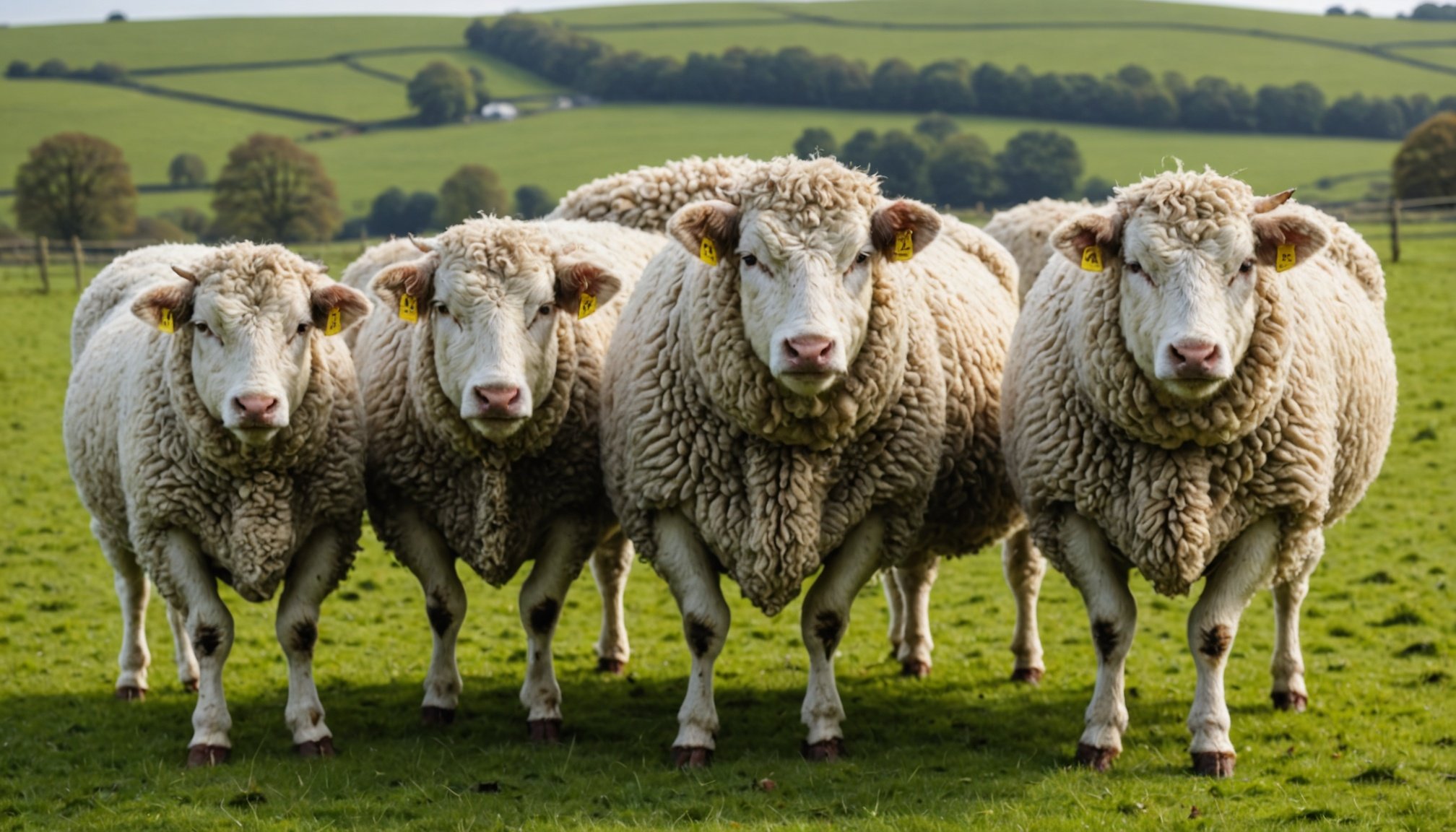Unveiling Pioneering Eco-Friendly Wool Farming Techniques in the UK
In the heart of the UK, a revolution is underway in the world of wool farming, driven by a commitment to sustainability, animal welfare, and environmental stewardship. This article delves into the innovative and eco-friendly wool farming techniques that are redefining the industry, making it a beacon of sustainable fashion and regenerative agriculture.
The Eco-Friendly Nature of Alpacas and Sheep
When it comes to sustainable wool farming, alpacas and certain breeds of sheep are at the forefront. Here’s why these animals are nature’s gift to conscious consumers:
This might interest you : Top Must-Have Traits of Sustainable Women’s Footwear in the UK: Your Ultimate Guide
Gentle on the Land
Alpacas, in particular, are exceptional in their environmental sustainability. Unlike goats and sheep, alpacas graze without uprooting plants, which helps maintain pasture health and prevents soil erosion. Their padded feet distribute their weight softly, avoiding the damage caused by hooved animals[1][3].
Key Benefits:
- Pasture Health: Alpacas help in maintaining healthy pastures by not damaging the roots of the plants.
- Soil Erosion Prevention: Their grazing practices prevent soil erosion, ensuring the land remains fertile.
- Minimal Human Intervention: Alpacas are naturally suited to their environment, requiring minimal human intervention to thrive.
Efficient Digesters and Minimal Chemical Use
Alpacas have highly efficient digestive systems, allowing them to consume less food compared to other livestock. This reduces the demand for agricultural land and water resources, making alpacas a low-impact choice. Additionally, their natural wool comes in over 20 shades, reducing the need for chemical dyes. When additional colors are required, plant-based dyes are used, ensuring minimal environmental impact[1][3].
Key Benefits:
- Low Resource Consumption: Alpacas require less food and water, making them sustainable.
- Natural Colors: The natural colors of alpaca wool reduce the need for chemical dyes.
- Plant-Based Dyes: The use of plant-based dyes further minimizes environmental impact.
Low Water Consumption in Production
One of the significant advantages of alpaca wool is its low water consumption during production. Here’s how it compares to other natural fibers:
Water Efficiency
Alpaca wool requires significantly less water for processing than other natural fibers like sheep wool or cotton. The fleece contains little lanolin and other oils, meaning it needs less washing. This not only reduces water consumption but also eliminates the need for harsh detergents and chemicals[1].
Comparison Table: Water Consumption in Wool Production
| Fiber Type | Water Consumption per Pound of Fiber |
|---|---|
| Alpaca Wool | 10 gallons |
| Sheep Wool | 30 gallons |
| Cotton | 50 gallons |
Sustainable Production Practices
At farms like Orange Inca, production centers are committed to maintaining sustainable practices throughout the wool preparation process. By using local resources and environmentally friendly methods, each piece of alpaca wool reflects a dedication to conservation[1].
Durable, Hypoallergenic, and Biodegradable
Alpaca wool isn’t just beautiful; it’s also practical and sustainable. Here are some key reasons why:
Durability
Alpaca fibers are stronger than cashmere, meaning products made from them last longer. This durability reduces the need for frequent replacements, aligning with sustainable consumption practices[1][3].
Practical Advice:
- Invest in Quality: Choosing high-quality alpaca wool products can save you money in the long run by reducing the need for frequent purchases.
- Care Instructions: Proper care, such as hand washing and drying flat, can extend the life of your alpaca wool products.
Hypoallergenic Properties
Unlike sheep wool, alpaca fleece lacks lanolin, making it a hypoallergenic option for people with sensitive skin[1][3].
Consumer Benefits:
- Skin Health: Alpaca wool is gentle on the skin, making it ideal for those with allergies or sensitive skin.
- Comfort: The hypoallergenic nature of alpaca wool ensures comfort and reduces the risk of skin irritation.
Biodegradability
When its life cycle ends, alpaca wool naturally decomposes, leaving no harmful residues behind. This is in stark contrast to synthetic fabrics that take hundreds of years to decompose[1][3].
Environmental Impact:
- Reduced Waste: Biodegradable alpaca wool reduces landfill waste and microplastic pollution.
- Nature Positive: The natural decomposition of alpaca wool aligns with nature-positive principles, ensuring a minimal environmental footprint.
Sustainable Livestock Management and Regenerative Farming
Sustainable livestock management is crucial for maintaining the health of the farm and the environment. Here are some practices that British farmers are adopting:
Rotational Grazing
Rotational grazing is a key practice in sustainable livestock management. By rotating the grazing areas, farmers prevent overgrazing and soil degradation. This method also improves soil health through managed grazing, enhancing farm biodiversity and productivity[2].
Key Benefits:
- Soil Health: Rotational grazing maintains soil fertility and structure.
- Biodiversity: It increases biodiversity by allowing different areas to rest and recover.
- Animal Welfare: It ensures that livestock have adequate space and nutrition.
Agroforestry and Conservation Tillage
Agroforestry involves integrating trees and shrubs into the farming system, which enhances biodiversity and ecosystem services. Conservation tillage reduces soil erosion and water loss, promoting beneficial soil organisms and root development[2].
Practical Implementation:
- Tree Integration: Planting trees that complement your crops and local climate can enhance ecosystem services.
- Minimal Tilling: Minimize ploughing and tilling to maintain soil structure and promote soil health.
The Impact on the Fashion Industry
The fashion industry is one of the most significant contributors to environmental pollution and waste. However, with the rise of sustainable fashion, there is a shift towards more eco-friendly materials.
Slow Fashion and High-Quality Products
Slow fashion emphasizes the importance of high-quality, durable products over fast fashion’s disposable culture. Alpaca wool, with its durability and hypoallergenic properties, is a perfect fit for this movement[1][3].
Consumer Advice:
- Invest in Quality: Choose high-quality alpaca wool products that will last longer.
- Care for Your Products: Proper care can extend the life of your alpaca wool products, reducing the need for frequent replacements.
Recycled Wool and Closed-Loop Systems
Some British farms and fashion brands are exploring the use of recycled wool to further reduce waste. This involves collecting old wool products, recycling them, and creating new products from the recycled fibre[5].
Innovative Practices:
- Recycled Wool: Using recycled wool reduces the demand for new raw materials and minimizes waste.
- Closed-Loop Systems: Implementing closed-loop systems where old products are collected and recycled to make new ones is a step towards a more sustainable supply chain.
Ethical and Animal-Friendly Practices
Ethical and animal-friendly practices are at the heart of sustainable wool farming in the UK.
Animal Welfare
Alpacas and sheep are treated humanely, with their annual shearing being a stress-free process that ensures their well-being. The Pasture for Life Certification guarantees that cattle and sheep are grazed on a natural, varied diet, supporting their health and well-being[4].
Quotes from Farmers:
- “We believe in treating our animals with the utmost respect and care. Their well-being is our top priority,” says a British farmer.
- “The Pasture for Life Certification ensures that our animals are raised in stress-free environments, which not only benefits them but also results in more flavorful and nutritious meat,” adds another farmer.
Supporting Regenerative Farming
By choosing pasture-fed beef and lamb or alpaca wool products, consumers are supporting regenerative farming practices that contribute to carbon sequestration, maintain healthy soils, and support biodiversity[4].
Environmental Benefits:
- Carbon Sequestration: Pasture-raised livestock absorbs more CO2 from the atmosphere than they produce.
- Soil Health: Grazing on natural pastures maintains healthy soils and reduces the need for artificial fertilizers.
- Biodiversity: Regenerative farming practices enhance biodiversity, leading to more resilient farming systems.
The UK is at the forefront of pioneering eco-friendly wool farming techniques, setting a new standard for sustainable fashion and regenerative agriculture. By choosing alpaca wool or British wool products, consumers are not only supporting sustainable practices but also contributing to a more environmentally conscious world.
Final Thoughts:
- “As consumers, we have the power to drive change through our choices. Choosing sustainable wool products is a small but impactful step towards a more sustainable future,” says a conscious consumer.
- “We are committed to sustainable practices that benefit both the environment and our animals. It’s a win-win for everyone involved,” concludes a British farmer.
In this new era of sustainability, the UK’s wool farming industry is leading the way, showing the world that fashion can be both stylish and eco-friendly. As we move forward, it’s clear that the future of wool farming is not just about producing high-quality materials but also about doing so in a way that respects the planet and its inhabitants.











